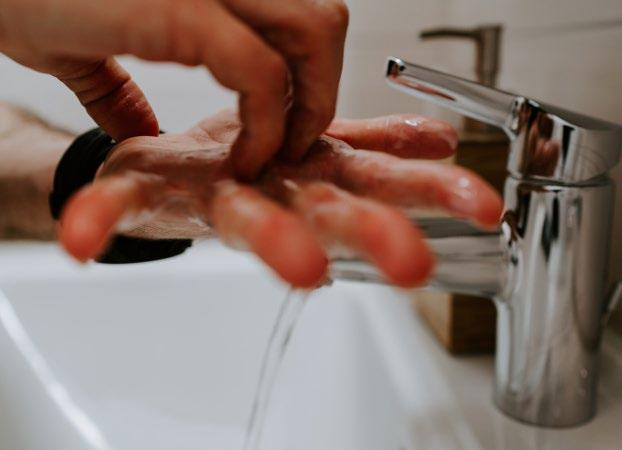
7 minute read
Coronavirus - How to stay safe
CORONAVIRUS
HOW TO STAY SAFE
Advertisement
The Governments guidelines are changing daily, we need to abide by the latest requirements and ensure we are staying home (Governments guidelines updated 23 March 2020).
As coronavirus continues to spread, some countries are putting their citizens on lockdown. China, Denmark, El Salvador, Ireland, Italy, France, New Zeland, Poland and Spain have already implemented the worlds largest and most restricted mass quarantines. This involves all public transport coming to a holt, closures of Schools universities and work. Most shops being shut, with only pharmacies and supermarkets kept open. In cases such as China, residents were only permitted to leave their homes to pick up essential supplies or seek medical help - and those who did leave were required to wear a mask.
MAIN MESSAGES FROM THE GOVERNMENT
If you live alone and you have symptoms of coronavirus illness (COVID-19), however mild, stay at home for 7 days from when your symptoms started.

If you live with others and you are the first in the household to have symptoms of coronavirus, then you must stay at home for 7 days, but all other household members who remain well must stay at home and not leave the house for 14 days. The 14-day period starts from the day when the first person in the house became ill.
Staying at home for 14 days will greatly reduce the overall amount of infection the household could pass on to others in the community.
If you can, move any vulnerable individuals (such as the elderly and those with underlying health conditions) out of your home, to stay with friends or family for the duration of the home isolation period. If you cannot move vulnerable people out of your home, stay away from them as much as possible.
If you have coronavirus symptoms do not go to a GP surgery, pharmacy or hospital. you do not need to contact 111 to tell them you’re staying at home testing for coronavirus is not needed if you’re staying at home.
Plan and ask others for help to ensure that you can successfully stay at home and consider what can be done for vulnerable people in the household.
Ask your employer, friends and family to help you to get the things you need to stay at home.
Wash your hands regularly for 20 seconds, each time using soap and water, or use hand sanitiser
If you feel you cannot cope with your symptoms at home, or your condition gets worse, or your symptoms do not get better after 7 days, then use the NHS 111 online coronavirus service. If you do not have internet access, call NHS 111. For a medical emergency dial 999
. THINGS TO HELP YOU PREPARE FOR NOW

The best thing you can do now is plan for how you can adapt your daily routine, and that of others in your household, to be able to follow this advice. Some of how you could prepare include:
Talk to your neighbours and family and exchange phone numbers of household contacts.
Consider and plan for those in your home who are considered vulnerable create a contact list with phone numbers of neighbours, schools, employer, chemist, NHS 111.
Set up online shopping accounts if possible.
WHY STAYING HOME IS SO IMPORTANT
Individuals with symptoms that may be due to coronavirus and their household members must stay at home. Staying at home will help control the spread of the virus to friends, the wider community, and particularly the most vulnerable.
Those with symptoms and living alone should remain at home for 7 days after the onset of their symptoms. This will reduce the risk of you infecting others.
If you live with others and you or one of them have symptoms that may be caused by coronavirus, then household members must stay at home and not leave your house for 14 days.
People living within a household will likely infect each other or may already be infected. Staying at home for 14 days will greatly reduce the overall amount of infection the household could pass on to others in the community.
STAY AT HOME
You and all household members should remain at home. Do not go to work, school, or public areas, and do not use public transport or taxis.
If possible, you should not go out even to buy food or other essentials, other than exercise, and in that case at a safe distance from others. The 14-day period starts from the day the first person in your house became ill.
If you require help with buying groceries, other shopping, or picking up medication, or walking a dog, you will need to ask friends or relatives. Alternatively, you can order medication by phone or online. You can also order your shopping online. Make sure you tell delivery drivers to leave items outside for collection if you order online. The delivery driver should not come into your home.
If you are an employee and unable to work due to coronavirus, please refer to this guidance from the Department for Work and Pensions to find out about the support that is available to you.
LIVING WITH CHILDREN
What we have seen so far is that children with coronavirus appear to be less severely affected. It is nevertheless important to do your best to follow this guidance.
If you have a vulnerable person living with you minimise as much as possible the time any vulnerable family members spend in shared spaces such as kitchens, bathrooms and sitting areas, and keep shared spaces well ventilated.

The incredible NHS staff working at Derriford Hospital (Image from Plymouth Live) live with and encourage them to sleep in a different bed where possible. If they can, they should use a separate bathroom from the rest of the household. If you do share a toilet and bathroom with a vulnerable person, you must clean them every time you use them (for example, wiping surfaces you have come into contact with). Another tip is to consider drawing up a rota for bathing, with the vulnerable person using the facilities first. You should do your very best to follow this guidance and everyone in your household should regularly wash their hands, avoid touching their face, and clean frequently touched surfaces.
CLEANING AND WASTE DISPOSAL When cleaning you should use your usual household products, like detergents and bleach, as these will be very effective at getting rid of the virus on surfaces. Clean frequently touched surfaces such as door handles, handrails, remote controls and table tops. This is particularly important if you have an older or vulnerable person in the house. Personal waste (such as used tissues) and disposable cleaning cloths can be stored securely within disposable rubbish bags. These bags should be placed into another bag, tied securely and kept separate from other waste. This should be put aside for at least 72 hours before being put in your usual external household waste bin. Other household waste can be disposed of as normal.
WHAT CAN YOU DO TO HELP YOU GET BETTER Drink water to keep yourself hydrated; you should drink enough during the day so your urine is a pale clear colour. You can use over-the-counter medications, such as paracetamol, to help with some of your symptoms. Use these according to the instructions on the packet or label and do not exceed the recommended dose. If you or your family need to seek medical advice, seek prompt medical attention if your illness or the illness in any household members is worsening. If it’s not an emergency, contact NHS 111 online. If you have no internet access, you should call NHS 111. If it is an emergency and you need to call an ambulance, dial 999 and inform the call handler or operator that you or your relative have coronavirus symptoms.
DO NOT HAVE VISITORS IN YOUR HOME Do not invite or allow social visitors, such as other friends and family, to enter your home. If you want to speak to someone who is not a member of your household, use the phone or social media. If you or a family member receive essential care in your home, then carers should continue to visit. Carers will be provided with facemasks and gloves to reduce the risk of you passing on the infection. If you have pets in the household At present, there is no evidence that companion animals/pets such as dogs and cats can be infected with coronavirus. We know that staying at home for a prolonged period can be difficult, frustrating and lonely for some people and that you or other household members may feel low. It can be particularly challenging if you don’t have much space or access to a garden. It’s important to remember to take care of your mind as well as your body and to get support if you need it. Stay in touch with family and friends over the phone or on social media.










